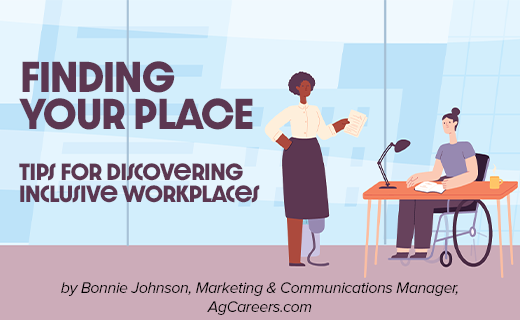- Candidates
- Login
- Set Up Account
- Create a Job Alert
- Search Tools
- Resources
- Employers

It’s tough to find something we can all agree upon. However, it’s hard to argue with this statement: We all want to feel respected, valued, comfortable, and welcome in our workplace. That is likely a shared foundation we can build on!
Employees and employers find an inclusive work environment leads to higher productivity, increased job satisfaction, improved workplace relationships, and improved health and well-being outcomes for employees. Agricultural and food employers also know that diversity and inclusivity programs help them compete against other employers for talent and attract recent graduates to their organization.
Both candidates and employers attempt to impress each other in the interview and recruiting process. So, how do you really tell if you’ll fit in at the organization? Will you feel comfortable and able to bring your true self to work? Will you belong?
I spoke with Dr. Bill Hendrix, Interim Executive Director for Together We Grow about locating an inclusive workplace. Hendrix suggested that you begin finding your fit by leveraging your network. “Start making connections through professional societies or internships,” suggested Hendrix.
“Each company has a ‘personality’ just like a human, and there’s nothing right or wrong about that,” shared Hendrix. “Find an organization whose personality is a fit with yours, and you’ll both be better for it,” added Hendrix. Your network and group involvement will often provide exposure to different potential employers and opportunities to assess companies’ personalities.
RANKINGS & BENCHMARKS
Another effective strategy is to consider external indicators, such as ranking guides and benchmark awards. Has an external organization recognized the employer for their DEI initiatives? This recognition can be a powerful indicator of the company’s commitment to these values. Here are a few ranking guides and benchmark awards to explore:
Employment Benchmarks:
Community Benchmarks:
Even if an employer is absent from a top list, they can still be inclusive and welcoming. Typically, these ranking lists feature larger corporations, but small companies may also foster a welcoming environment that you can evaluate in other ways.
OTHER STEPS TO ASSESS EMPLOYERS
Once you’ve identified a potential employer, you can better assess them through their company website. “The first place to look is if they have a space dedicated to D.E.I. on their website,” noted Hendrix. Look for a mention of Employee Resource Groups (ERGs) and Diversity Councils. “It’s also important that these groups have a voice back to management, too,” added Hendrix.
You’ll often find DEI information in corporations’ sustainability report. “Look for statistics, percentages, and metrics—these real numbers indicate that the organization is much further on in its diversity journey,” advised Hendrix.
For corporations, it’s crucial to verify their EEOC (Equal Employment Opportunity Commission) and diversity statements. These provide legal and official information about the company’s diversity practices. Also, consider their visibility within the local community and support of parity issues, additional indicators of their commitment to diversity and inclusivity.
Remember you are also interviewing the company during the interview process. If you’re worried about getting a job and finding the right fit, there are other opportunities out there. Seek a place where you are fully accepted.
“Be the change you want to see in the world”
-Mahatma Gandhi
Alternatively, if you find yourself with an organization that is still developing an inclusion initiative or doesn’t even have one, you can get involved and make a real impact! There’s a place for everyone in agriculture.
Start searching for your perfect spot today at AgCareers.com.
Dr. Bill Hendrix,
Interim Executive Director, Together We Grow
Together We Grow is a consortium of some of the world’s largest agribusiness and food interests focused on building the workforce of tomorrow and ensuring that the workforce is skilled, diverse, and inclusive. Previously, Bill concluded a 32-year career in the agricultural industry while also serving on boards for the Cultivating Change Foundation, AFA’s Executive Ambassador Program, FFA’s President’s Advisory Board, among many other volunteer commitments.
Bill has testified before Congress twice on workplace equality and was recognized by Out and Equal with the prestigious Trailblazer for Workplace Equality award in 2010 and as GLBT Scientist of the Year in 2011 by the National Organization for Gay and Lesbian Scientists and Technical Professionals.
Bill’s passion is increasing student opportunities in STEM and working to ensure that diverse voices are represented within this conversation.